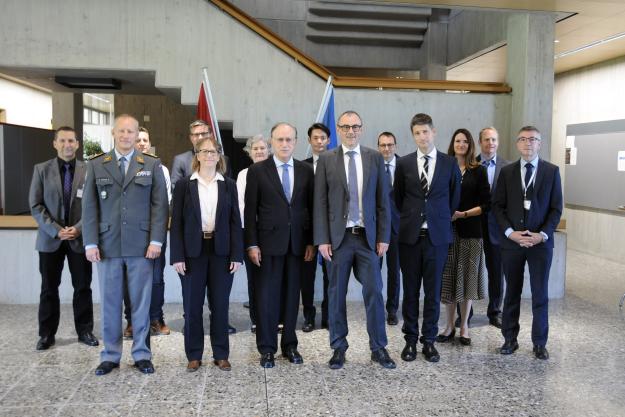
Dr Marc Cadisch, Director of the Spiez Laboratory, and Ambassador Fernando Arias, Director-General of the OPCW
THE HAGUE, Netherlands—16 September 2022—The Director-General of the Organisation for the Prohibition of Chemical Weapons (OPCW), Ambassador Fernando Arias, travelled to Switzerland from 11 to 13 September to visit the Spiez Laboratory and meet with Swiss senior officials.
At the Spiez Laboratory, the OPCW Director-General delivered a keynote speech at the opening of the Spiez CONVERGENCE Conference. This annual workshop, which builds upon the work of the OPCW’s Scientific Advisory Board (SAB), engages scientists and industry and arms control professionals to discuss emerging scientific and technological developments related to the convergence between chemistry and biology.
In his remarks, the Director-General stated that: “Scientific collaboration of this kind is an integral part to the OPCW’s success in its core mission to oversee the implementation of the Chemical Weapons Convention (CWC). New methods of chemical warfare represent a persistent challenge that requires all our collective attention. The scientific perspective is the only way to ensure that the international community remains equipped to face such challenges.”
The Director of the Federal Office for Civil Protection, Dr Michaela Schärer stated: “Our Spiez CONVERGENCE 2022 is part of the strategy of the Swiss Federal Council for arms control and disarmament; and as such, a contribution of Switzerland to an active science and technology review.”

The Director of Spiez Laboratory, Dr Marc Cadisch remarked: “For more than 20 years Spiez Laboratory has been a Designated Laboratory of the OPCW. We support the OPCW’s work at various levels. We are proud of this work in the interest of arms control, non-proliferation, and international security.”
During his visit, the Director-General Ambassador Arias met with H.E. Ms Helene Budliger Artieda, State Secretary for Economic Affairs. The Director-General briefed on progress in the implementation of the CWC and provided an overview of the latest developments in the project to construct an OPCW Centre for Chemistry and Technology. He further expressed his gratitude for the enhanced engagement and cooperation of the Swiss Confederation.
The Director-General also met with H.E. Ambassador Pälvi Pulli, Head of Security Policy in the Federal Department of Defence, Civil Protection and Sport, and other senior high-ranking officials from the Federal Department of Foreign Affairs.
Background
Switzerland has been an active member of the OPCW since the Chemical Weapons Convention entered into force in 1997.
The Spiez Laboratory is the Swiss institute responsible for the protection of the population against nuclear, biological and chemical threats and dangers. It is part of the Federal Department of Defence, Civil Protection and Sports (DDPS) and is located in Spiez, Switzerland. The OPCW-designated laboratory has made significant contributions to the OPCW’s analytical proficiency capabilities and has been a major contributor to the OPCW Central Analytical Database, the Organisation’s reference library of chemical data.
OPCW Designated Laboratories must be able to perform off-site analysis of chemical samples collected by OPCW inspectors from chemical production facilities, storage depots and other installations, or from the site of an alleged use of chemical weapons.
When designating laboratories for the analysis of authentic samples the Director-General takes the following into account:
- Whether the laboratory has established a quality system in accordance with the standards (ISO/IEC 17025:2017 or equivalent) and has valid accreditation by an internationally recognised accreditation body for the tasks for which it is seeking designation—namely, for the analysis of chemical-warfare agents and related compounds in various types of samples; and
- Whether the laboratory has performed successfully in the proficiency testing programme of the OPCW.
As the implementing body for the Chemical Weapons Convention, the OPCW, with its 193 Member States, oversees the global endeavour to permanently eliminate chemical weapons. Since the Convention’s entry into force in 1997, it is the most successful disarmament treaty eliminating an entire class of weapons of mass destruction.
Over 99% of all declared chemical weapon stockpiles have been destroyed under OPCW verification. For its extensive efforts in eliminating chemical weapons, the OPCW received the 2013 Nobel Peace Prize.
